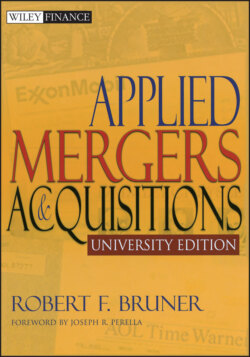Читать книгу Applied Mergers and Acquisitions - Robert F. Bruner - Страница 22
CHAPTER 2 Ethics in M&A INTRODUCTION
ОглавлениеEthics and economics were once tightly interwoven. The patriarch of economics, Adam Smith, was actually a scholar of moral philosophy. Though the linkage between the two fields may have worn thin in the twentieth century, they remain strong complements.1 Morality concerns norms and teachings. Ethics concerns the process of making morally good decisions, or as Andrew Wicks writes, “Ethics has to do with pursuing—and achieving—laudable ends.”2 The Oxford English Dictionary defines “moral” as “Of knowledge, opinions, judgments, etc.; Relating to the nature and application of the distinction between right and wrong.”3 “Ethics,” on the other hand, is defined as “The science of morals.”4
Ethical dilemmas pervade the field of mergers and acquisitions. For instance, consider these five cases:
1 The CEO of a firm sought to prepare the firm for sale. Part of this entailed the use of accounting policies to improve the financial track record of the firm. The practice of “prettying up” a target company for sale may be widespread—is this unethical?
2 A firm pursued an aggressive strategy of growth by acquisition that relied on creating the appearance of high growth, when in fact the companies acquired were mature and growing slowly. The appearance fueled expectations of prolonged growth, granting the firm a high share price, and therefore a strong acquisition currency with which to do more deals. Was this strategy of momentum acquiring unethical? Many companies aim to persuade investors of good growth prospects even when that growth is uncertain. Is such persuasion unethical?
3 The directors of a public corporation approved without much analysis or discussion a leveraged buyout proposal from the CEO at a relatively low price. A number of the directors were friends or affiliates of the CEO. Was the behavior of the directors unethical? Most directors develop a personal or social acquaintance with the CEOs they employ. Is this affiliation unethical?
4 A large investment bank refused to provide acquisition financing for a deal unless it was to be listed as the lead underwriter, ahead of its rival, another firm also in the underwriting syndicate. Is the use of bargaining power unethical?
5 In response to a hostile takeover attempt, a CEO considered paying “green-mail” to make the raider go away. The CEO had a strong self-interest in the outcome of the takeover attempt, as the retention of his position hinged on it. Is the payment of greenmail unethical?
The ethical dilemmas in M&A are rarely clear—or, if they are, they may entail a violation of the law. The field of business ethics offers no easy answers to dilemmas. But a failure to reflect seriously on them easily leads to unhappy outcomes. The long tradition in Western civilization says that ethical behavior promotes sustainable life; unethical behavior does not. The aim in this chapter is to sound a strong cautionary note and stimulate the M&A professional to reflect carefully on the ethical dilemmas embedded in the field.
